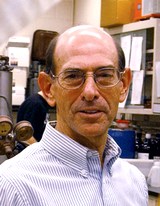
 |
Friday, October 19, 2012 Meeting |
|---|
| Richard Eisenberg |  |
Tracy H.Harris Professor of Chemistry, |
|
“Molecular Systems for Light-Driven Hydrogen Production” |
|
Date: Friday, October 19, 2012 Location: Northwestern University
Technological Institute
2145 Sheridan Road
Evanston, IL 60208
Lecture room 3, 1st floor
Dinner: Hilton Orrington/Evanston
1710 Orrington Ave
Evanston, IL 60201
Cost: $35 for members of ACS and their guests, $37 for non-members, and $20 for students, retired, or unemployedBECAUSE OF THE REQUIREMENTS FOR ADVANCED NOTIFICATION AT THE HILTON ORRINGTON, REGISTRATION FOR DINNER IS CLOSED! PLEASE JOIN US AT NORTHWESTERN FOR THE LECTURE.
Dinner reservations are required and should be received in the Section Office via phone (847-391-9091), email (chicagoacs@ameritech.net), or web by noon on Tuesday, October 16. PLEASE HONOR YOUR RESERVATIONS. The Section must pay for all food orders. No-shows will be billed. Seating will be available for those who wish to attend only the meeting.
Please REGISTER ON LINE
4:30 - 5:30 PM · Basolo Medal Lecture at Northwestern Technological Institute
No job club this evening
6:00 · 7:00 PM · Reception for Dr. Eisenberg at the Hilton Orrington
7:00 - 8:00 PM · Dinner will be at the Hilton Orrington
8:00 PM · General Meeting at the Hilton Orrington
- Opening remarks and announcements: Avrom Litin, Chair, Chicago Section, American Chemical Society
- Presentation of the 2012 Basolo Medal: Peter Stair, Chair of Department of Chemistry, Northwestern
- Acceptance: Dr. Richard Eisenberg, 2012 Basolo Medalist for Outstanding Research in Inorganic Chemistry
- Closing Remarks: Avrom Litin
Information about the Fred Basolo Award
Abstract: This century's greatest technological challenge is the conversion of sunlight into usable energy in a sustainable, environmentally benign and carbon-neutral way on a global scale. For light to chemical energy conversion in a designed photosynthetic system, the splitting of water into its constituent elements is the key energy-storing reaction. As with natural photosynthesis, such a system relies on light absorption, charge separation, and catalysis. Recent efforts in the Eisenberg laboratory are described that focus on different components and system compatibility for the reductive side of the water splitting reaction and the visible light-driven generation of hydrogen from aqueous protons. The light absorbers include metal complexes with triplet charge transfer (CT) excited states, organic dyes and very recently, semiconductor nanoparticles. As catalysts for the generation of hydrogen, different sets of metal complexes have been investigated, including previously unstudied systems that exhibit high activity. These molecular catalysts are composed only of earth abundant elements. Studies are described to provide clues to initial charge transfer steps and sources of system instability.
Biography: Richard Eisenberg is Tracy Harris Professor of Chemistry at the University of Rochester. A native New Yorker, he received his undergraduate and graduate degrees from Columbia University. In 1973, he joined the faculty of the University of Rochester after six years as Assistant and Associate Professor at Brown University in Providence, RI. He served as Chair of the UR Chemistry Department from 1991-'94 and was named to the Harris Chair in 1996. Eisenberg's research interests are in inorganic and organometallic chemistry, photochemistry relating to solar energy conversion, and catalysis. Some of Eisenberg's specific research activities include the photogeneration of hydrogen from water, luminescent square planar complexes and their incorporation into molecular assemblies for photoinduced charge separation, the development of parahydrogen induced polarization for hydrogen addition reactions, luminescent gold and copper complexes for application in electroluminescent devices, and the design of new electrophilic catalysts for electrocyclizations and tandem organic transformations.
He has mentored more than eighty Ph.D. and postdoctoral research students. Foremost among his activities in the chemistry community, Eisenberg is the Editor-in-Chief of Inorganic Chemistry, the leading journal in its field. He has also served as Chair of the Inorganic Division, Chair of the Organometallic Subdivision, Chair of the Gordon Research Conference on Organometallic Chemistry and as a member of the editorial advisory boards of the Journal of the American Chemical Society, Inorganic Chemistry, Organometallics and Accounts of Chemical Research. He has been the recipient of a number of awards including the 2003 ACS Award for Distinguished Service in the Advancement of Inorganic Chemistry and shared the 2011 ACS Nobel Laureate Signature Award in Graduate Education with his student Ping-wu Du. In 2010, he received the Lifetime Achievement Award for Graduate Education from the University of Rochester. Eisenberg was elected a Fellow of the American Association for the Advancement of Science in 2005, a Fellow of the American Academy of Arts and Sciences in 2009, and a Member of the U. S. National Academy of Sciences in 2010.
Parking: After 4:00 p.m. parking is available in the lot across from the Technological Institute at the corner of Noyes Street and Sheridan Road. Parking is also available on the side streets just west of this lot; however, observe the posted signs.
Lecture room 3 is on the first floor of the Technological Institute and is most easily reached by entering through the main doors facing Sheridan Road. The lecture room is clearly marked and there will be signs at the entrance to guide you to the room.
Dinner: Map and directions The hotel is about one mile south of the Institute. Take Sheridan Road south to Chicago Ave. Stay on Chicago Ave. to Davis Street Turn right onto Davis St. and take the first right onto Orrington Ave. The hotel is on the left. Note that the streets around the hotel are one-way. Parking: There will be valet parking and parking vouchers will be distributed.
Dinner:
A reception and dinner will be at the Hilton Orrington.
| Last updated 10/22/12 Copyright © 2009-2012, Chicago Section, The American Chemical Society |
Webs by Wizardcraft |